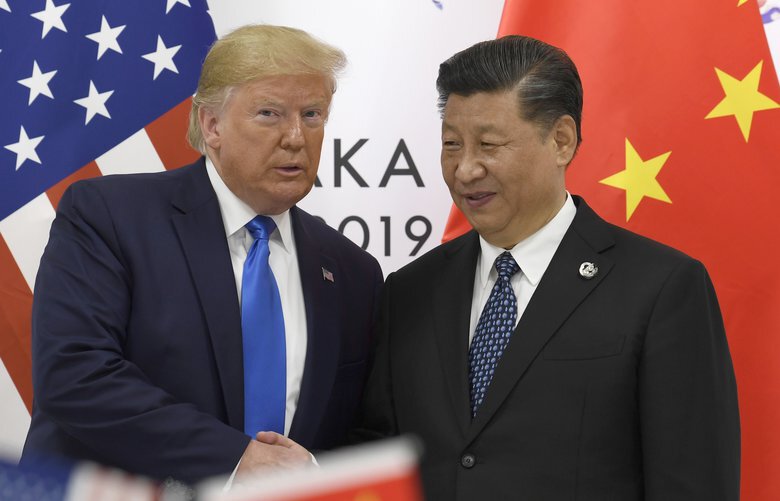I am suspicious of hot takes on the pandemic. They’re usually headlined, “COVID-19 will change (fill in the blank) forever.”
Most of these predicted apocalypses involve things I like: downtowns, transit, sit-down dining and brick-and-mortar retail shopping. But as Chinese statesman Zhou Enlai is reputed to have said about the consequences of the 1789 French Revolution (or the 1968 French student revolt), “It’s too early to say.” After all, the much deadlier 1918 influenza pandemic didn’t change everything.
So I propose to write a cold take on how the pandemic might be the inflection point into a much different relationship between the United States and China. At its most extreme, it might accelerate the decoupling of the world’s two largest economies.
This would have profound consequences, not least for Washington state. China is our largest merchandise export customer.
“There are many things we could do,” President Donald Trump said recently about China on Fox Business. “We could cut off the whole relationship.“
U.S. Trade Representative Robert Lighthizer this month decried the globalization policies that had sent jobs offshore, particularly to China.
He wrote in a New York Times op-ed that Trump’s message to American companies was simple: “If you want certainty, bring your plants back to America. If you want the benefits of being a U.S. company, and the protection of the U.S. legal system, then bring back the jobs.”
Lighthizer, a longtime hawk against the U.S.-China status quo, said that thanks to Trump’s tariffs, “the offshoring frenzy started to abate.”
Perhaps.
U.S. manufacturing employment has remained near modern lows. Chinese foreign direct investment (FDI) in U.S. companies fell from a high of more than $46 billion in 2016 to $4.8 billion this past year. But American FDI in China was more than $14 billion in 2019, consistent with levels of the past decade.
And this is just a consequence of the trade war, not the pandemic. China has been criticized by both political parties for lack of transparency about COVID-19, which apparently began there.
Some of this is political. Seeking to deflect criticism of the Trump administration’s deadly incompetence in handling the pandemic, Republicans put out a 57-page strategy memo to brand Democrats as soft on China.
This gambit counts on short attention spans by the electorate. Trump repeatedly praised Chinese President Xi Jinping and China’s handling of the pandemic in January and February. This was before he labeled COVID-19 the “China virus” and turned on the World Health Organization, blaming it for softness on China.
American politics also has a long history of presidential contenders calling for measures to “get tough on China” for unfair trade practices and human-rights violations. Once in office, they revert to U.S. policy since the Nixon administration, seeking to manage China’s peaceful rise. The hope: A prosperous China would become more democratic and join the U.S.-led, rules-based liberal world order.
That hasn’t happened. And more people than Trump have pondered Plan B, especially after the pandemic showed how dependent America was on China for masks and certain vital drugs.
This past November, the National Bureau of Asian Research, a think tank with offices in Seattle and the other Washingon, published a report on how partial disengagement might look.
It recommended a strategy that would achieve a cease-fire in the destructive tariff war; slow the transfer of critical technologies to China and increase defensive measures to counter Chinese sabotage, disruption and surveillance; invest in U.S. innovation, education and technology, and strengthen relationships with close allies. The latter sounds like the Trans-Pacific Partnership, which Trump abandoned.
Under the status quo, China benefits from an open American market while keeping much of its market closed. Partial disengagement, as defined by the think tank, would use these measures to “apply significant pressure on China to improve its behavior while helping to protect the core of at least a partial rules-based liberal economic order.”
Others are proposing a much more radical decoupling via a national industrial strategy. This would include requirements for domestic production and controls on U.S. exports. As Sen. Marco Rubio told The New York Times in April, “There comes a point where, as a nation, we have to ask ourselves what are the critical goods that you must retain the ability to make even if it’s not the most efficient outcome. I think that’s now right before us.”
Yet decoupling would be difficult. Companies such as Apple, Google and Microsoft might gradually shift some hardware production to India, Thailand or Vietnam. This is a diversification strategy and looks smart in theory. But they won’t find China’s large ecosystem of established factories and experienced, tech-trained workers.
This also risks alienating customers in the world’s largest market. For example, Microsoft has been in China since 1992. Starbucks is investing $130 million to build its largest overseas coffee roasting plant near Shanghai. The Seattle-based giant aims to have 6,000 stores in China by 2022.
China is Boeing’s most important overseas customer and is expected to become the world’s largest commercial airplane market in less than 15 years. The country is also an important part of Boeing’s supply chain, and a 737 finishing center is located there.
As a result, a full-scale decoupling would bring certain losers and uncertain winners. Costs would rise, especially if consumer-goods factories were returned to the United States.
Reshoring sounds great. But, as I’ve written before, it would take a long time and involve highly automated factories, not the levels of employment seen before 2000.
The most important question is whether Americans would be willing to pay significantly more for domestically produced goods.
Or maybe that’s the second-most important question. What about China’s appetite for $1 trillion in U.S. Treasury debt, which underscores the benefit of being the world’s safe haven? What if Beijing starts to bail?
Xi’s nationalism and grievances are only enhanced by the same from his admirer, Donald Trump. These stances distract criticism of their domestic failures, not least in handling the pandemic.
But two nuclear-armed nations sliding into confrontation is the worst-case scenario.
That’s not too early to say.

















